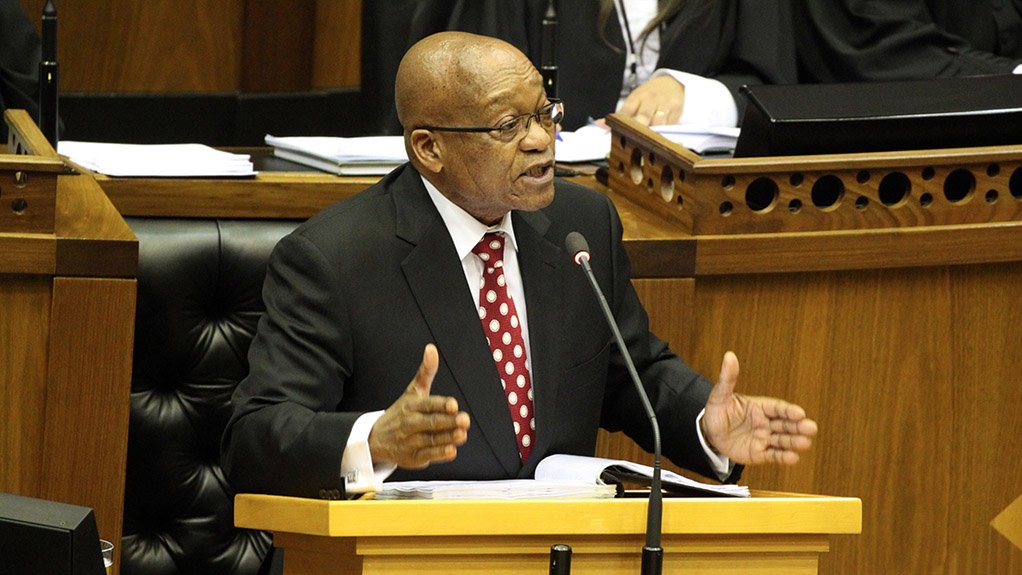/ MEDIA STATEMENT / The content on this page is not written by Polity.org.za, but is supplied by third parties. This content does not constitute news reporting by Polity.org.za.
The state capture commission has rejected the evidence of former president Jacob Zuma that he did not try to impose Siyabonga Gama as group CEO on the board of Transnet in 2009. Gama was at that point the CEO of Transnet Freight Rail (TFR), a subsidiary of Transnet, and seeking to be promoted to group CEO of the larger company.
Evidence led before the commission was that Gama was at the time the subject of an internal investigation into allegations of corruption relating to a security contract that he had approved irregularly in his capacity as TFR CEO. This was an impediment to his ascent to the GCEO position, according to the board at the time. In fact, Gama was not recommended for shortlisting to then public enterprises minister Barbara Hogan.
Despite this, Zuma wanted him to be promoted to the GCEO position. This after the board had twice undertaken a recruitment process, the first producing current public enterprises minister Pravin Gordhan as its preferred candidate, and a later one in which the preferred candidate was then BP South Africa CEO Sipho Maseko. Gordhan’s candidacy was withdrawn when he was appointed Sars commissioner, while Maseko’s recommended appointment lingered for months while Zuma delayed its tabling at a cabinet meeting for which a recommending memorandum had been prepared by the board and was to be presented by Hogan.
During his appearance before the commission in July 2019, Zuma denied that he stalled the appointment of Maseko while pushing for Gama to take office, saying it would go against due process. But Zondo rejected this version, concluding in his report that Hogan’s version carries water on the basis that she produced evidence of having written to Zuma ahead of a scheduled cabinet meeting requesting his urgent endorsement for the tabling of the memorandum. Zuma, she said, subsequently instructed her to withdraw the memorandum, without any explanation.
“Mr Zuma’s version must be rejected as a complete fabrication. If he had no objection to appointing Mr Maseko who was recommended by both the board and his minister of public enterprises, why then was Mr Maseko not appointed?” writes Zondo.
“On Ms Hogan’s version, the reason why Mr Maseko was not appointed is that Mr Zuma would not allow the matter to be taken to cabinet because he said that his only choice was Mr Gama. Mr Zuma fled the commission before he could be asked to explain this. Therefore, on his version there is no explanation for why Mr Maseko was not appointed.”
Gama’s fate was dismissal after a disciplinary process found him guilty of misconduct, and he lost his TFR position later that year. Around this time there was public opposition to both his dismissal and what his supporters in the ANC and trade unions called a snub. Among his vocal supporters was then cabinet minister Siphiwe Nyanda whose company Gama had been found guilty of unduly favouring in his misconduct case.
During a cabinet reshuffle of late 2010, Hogan was removed as minister and replaced by Malusi Gigaba, who almost immediately instructed the board – newly chaired at this point in December of that year by Mafika Mkwanazi – to look into the matter of Gama’s dismissal and seek advice on how he can be reinstated.
This was indeed done, and Gama was reinstated to his TFR post in 2011, shortly after the arrival of Brian Molefe as GCEO of Transnet. In the same year, for the first time, notes Zondo, the board of Transnet was to have a say in how procurement matters occur, through a newly-established board acquisitions and disposals committee (BADC), with Iqbal Sharma, an associate of the Gupta family, chairing it.
Molefe stayed in office until April 2015, when he moved to Eskom. In the time that he was at Transnet, however, major changes were made to his delegation of authority and that of GCFO Anoj Singh, as well as the BADC. Incidentally, Zondo points out, it was also in this period of high value tenders for locomotives and other projects that companies associated with the Gupta family also benefited from contracts with Transnet.
Between 2011 and 2017, Transnet had spent over R70-billion on its procurement of locomotives, with contracts of varying focus and value benefiting through the abuse of the company’s confinement process. In confinement, Transnet does not have to go out to open tender, but instead makes a recommendation to its board for the procurement to be confined to a single supplier, provided certain criteria are met. Zondo’s report notes a rise in the abuse of the confinement practice by Molefe, Singh and Gama – whose TFR was the procurer of the locomotives.
Equally, the report finds that on the basis that the executives also happened to have a relationship with the Gupta family outside of the business of Transnet, they should be investigated for their role in enabling its capture by companies belonging in the Gupta enterprise.
Gama was eventually appointed as acting GCEO upon the departure of Molefe to Eskom, and later became permanent in the position, until resigning in 2018. His appointment, Zondo found, only served to continue the capture that had already been enabled by Molefe during his term. Much of the business that went to Gupta companies, according to the report, would not have done so had it not been for the proximity of both Zuma and Gigaba to the Guptas, and in turn for their positions of power at the time.
Issued by Corruption Watch
EMAIL THIS ARTICLE SAVE THIS ARTICLE ARTICLE ENQUIRY
To subscribe email subscriptions@creamermedia.co.za or click here
To advertise email advertising@creamermedia.co.za or click here











